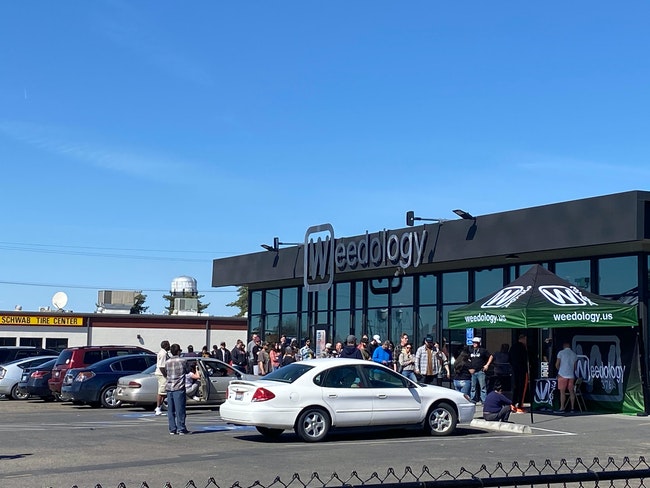
Weedology in Ontario is one of the marijuana dispensaries that city officials say serves thousands of customers coming to town from Idaho. That fact should lead to a change in tax distribution, the city contends. (File photo)
Ontario city officials are again requesting that the state modify the formula for determining how much money the city gets from marijuana sales in order to get more for Ontario.
The statewide cannabis tax sharing program currently distributes money to cities based on population and number of marijuana dispensaries. Unlike many Oregon cities, the majority of Ontario’s marijuana sales come from customers in Idaho, who aren’t counted in the city’s population.
Because of that, the city wants the state to create an exemption to the formula for cities that meet certain requirements by basing it on total sales.
A June 25 letter from all six Ontario city councilors and Mayor Riley Hill to House Speaker Rep. Tina Kotek, (D-Portland), asked her to “fight for us to correct an unanticipated consequence of Measure 91.” Under Measure 91, the state collects a 17% tax on marijuana sales, with 10% disbursed to local governments for public safety, according to the letter.
Adam Brown, Ontario city manager, said population counts for 75% of the formula, while the number of marijuana dispensaries counts for 25%. Ontario has five marijuana dispensaries that are licensed by the city.
“Our resident population is 11,485, so when 75% of the formula is based on Ontario’s population, but our city services are being burdened by three-quarters of a million people from the Boise market, it really puts a strain on our community,” according to the letter. “Based on the most recent sales data, we anticipate that we are seeing an additional 750-1,000 cars a day coming into and out of our city, straining the system.”
By providing for Ontario’s circumstance, according to the letter, the city would’ve had $836,006 in state revenue sharing rather than $52,795.
The letter follows a similar effort by city officials in January, when the city sought a formula based on total sales, which was sent to the House Interim Committee on Revenue, Gov. Kate Brown, Sen. Peter Courtney, (D-Salem), Sen. Lynn Findley, (R-Vale), and Kotek.
“We are the largest city located in the poorest county in Oregon and we are sending $783,211 to other cities across the state,” according to the June letter. “Our median housing income is $34,940. Nearly one-third of our community lives in poverty. Ontario needs this money to help our community.”
Brown said the city decided to write another letter because Malheur County’s economic development director “recommended that we get something in the special session omnibus bill.”
“We need someone in the House to take up our interest,” said Brown.
Currently, the city levies a 3% tax on marijuana sales, Brown said. That money goes toward the city’s general fund to pay for projects and cover the city’s retirement debt.
Specifically, the city wants state rules changed to provide special treatment for cities with a population over 10,000 located in an area with social and economic ties linking Oregon and Idaho, totaling a population over 600,000.
In the letter, city officials compared crime in Ontario to that in Portland, saying that “a person in Ontario is just as likely if not more likely, to be impacted by violent or property crime in Ontario as they are in Portland.”
Further, the letter discusses how Ontario has consistently been called “one of Oregon’s most unsafe communities in several studies over the last 20 years.”
“Ontario has struggled to keep our community as thriving as it once was over the last 20 years,” according to the letter. “We want to return to that thriving state, but we need your help.”
Reporter Kezia Setyawan contributed to this report.
News tip? Contact reporter Bailey Lewis at [email protected] or call 541-473-3377.
KEEP THE ENTERPRISE GOING AS OTHERS CLOSE…..
Reader support allows the Enterprise to provide in-depth, accurate reporting that otherwise would not get done. Keeping the community well informed is essential. SUBSCRIBE – $5 a month, automatically. DONATE – to provide additional support.




